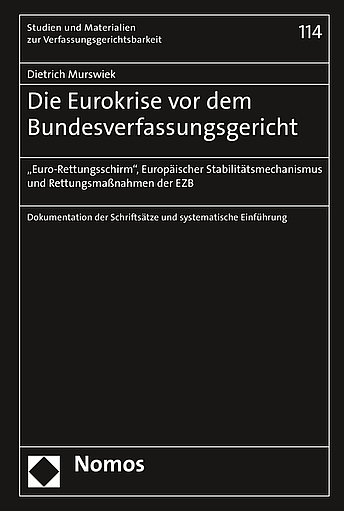englischDoes the “Euro rescue” endanger democracy? Dietrich Murswiek presents his pleadings from the proceedings against the rescue policy. This is contemporary constitutional and European law in pleading form.
Will the rescue policy lead to the collapse of the foundational pillars upon which the stability architecture of the monetary union rests? Is the budgetary sovereignty of the Bundestag impaired by international liability mechanisms as well as by the assumption of indeterminable budgetary risks? Is the ECB overstepping its mandate for monetary policy with its programmes for purchasing government bonds of states in crisis? Does the ECB lack democratic legitimation for its policies? Is the European Stability Mechanism (ESM) compatible with the principle of democracy? Murswiek argues for democracy, against bureaucratic self-empowerment and for the liberal principle of interdependency of individual responsibility and liability. The book is a repository of arguments with respect to democratic legitimation in the European association of states.
Gefährdet die „Euro-Rettung“ die Demokratie? Dietrich Murswiek präsentiert seine Schriftsätze aus den Prozessen gegen die Rettungspolitik. Das ist aktuelles Staats- und Europarecht in Schriftsatzform.
Bringt die Rettungspolitik die Grundpfeiler zum Einsturz, auf denen die Stabilitätskonstruktion der Währungsunion ruht? Wird die Budgethoheit des Bundestages durch internationale Haftungsmechanismen sowie durch die Übernahme unüberschaubarer Haushaltsrisiken beeinträchtigt? Überschreitet die EZB mit ihren Programmen zum Ankauf von Staatsanleihen der Krisenstaaten ihr geldpolitisches Mandat? Fehlt ihr für ihre Politik die demokratische Legitimation? Ist der Europäische Stabilitätsmechanismus (ESM) mit dem Demokratieprinzip vereinbar?
Vor dem Hintergrund der Euro-Rettungsmaßnahmen betont der Autor die Notwendigkeit demokratischer Legitimation im europäischen Staatenverbund. Bei der Bewältigung der Eurokrise müsse außerdem das liberale Prinzip der Wechselbezüglichkeit von Eigenverantwortlichkeit und Haftung beachtet werden.


